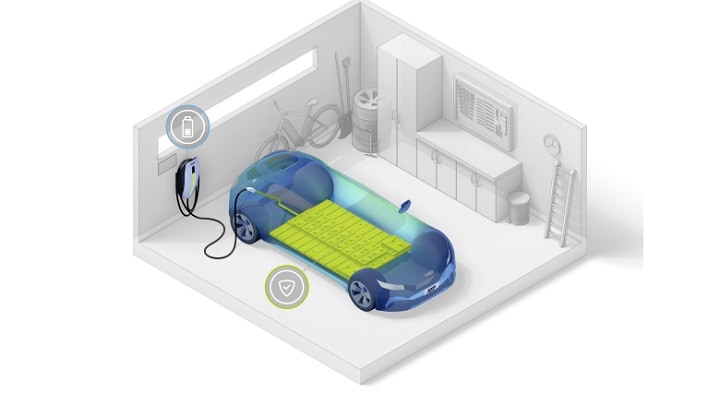While lead has had many applications in the past, it is phased out almost everywhere due to its
high toxicity to humans. One remaining application is the 12 V starter battery found in almost
every car today. Making the switch from lead-acid to lithium-Ion (Li-Ion) batteries is the basis
of current proposals to update legislation on the topic in the EU.
Lead-Acid vs. Lithium-Ion Battery Cell Technology
Added to those sustainability requirements, Li-Ion batteries also offer superior gravimetric and
volumetric energy density that lead to significant weight and space savings in the vehicle. The
technology also allows to recuperate more energy during braking (higher dynamic charge
acceptance), improving the powertrain efficiency. The lower self-discharging rate, a superior
cycle-stability and extended shelf-life mean that Li-Ion batteries need to be replaced later than
their lead-acid equivalents1. One challenge with Li-Ion technology was the cold
temperature performance that made it unsuitable for cranking the internal combustion engine (ICE)
in cold weather conditions. However, in a recent technology comparison led by the European
Automobile Manufacturers Association EAMA, the Li-Ion cold cranking performance was considered
equal to lead-acid. Although Li-Ion battery prices fell about 89% between 2010 and
20202, cost remains as the main disadvantage.

With the ongoing electrification of the vehicle’s powertrains, the dominance of the cold cranking
requirement is weakened. In the case of plug-in hybrid electric vehicles, carmakers use the
high-voltage system to start the ICE. This means that there is no need for a cold-start capable 12
V system. We believe that lead-acid will be replaced by lithium-ion technology in the 12 V battery
of both hybrid and purely electric vehicles soon, as the extended lifetime is adding true customer
value. Unlike lead-acid batteries, Li-ion batteries require a battery management system (BMS) to
fulfil vital functions including safety, capacity and multi-cell management as well as charging
control.
Benefits of an Integrated BMS Solution
All Li-Ion batteries require a BMS to fulfil vital functions including safety, capacity and
multi-cell management as well as charging control. NXP offers a complete all-in-one solution for
12 V Li-Ion battery management including accurate monitoring and safeguarding of 3 to 6 cell
voltages, temperature sensing and current measurement. The latest C-revision of the battery cell
controller (BCC)
MC33772 comes with
all new features build to answer customers needs. On-chip averaging of measurements effectively
acts as a digital filter and helps to reduce the load on the communication bus and
microcontroller, while allowing for the removal of part of the analog filtering. This helps to
reduce the overall eBOM cost, resulting in a high-quality and cost-optimized solution.

Safety
The AEC-Q100 compliant IC is fully qualified for automotive functional safety applications as it
was designed according to ISO 26262, enabling ASIL C at the chip-level. Similarly, it is suitable
for other lead-acid replacing applications including RV-auxiliary batteries, golf carts and solar
banks as well as in drones, logistics robots and more.
Enablement
As part of our enablement, NXP developed an evaluation board and has several proof-of-concept
boards readily available including documentation, testing and demo software. To complement the
evaluation kit, we will also be offering production ready AUTOSAR® complex device
drivers that accelerate our customers development timeline.
Due to the ever increasing lead regulation as well as the further falling prices for Li-Ion
battery cells the phase-out of automotive lead-acid battery technology might come sooner rather
than later. At NXP, we are ready to enable our customers to switch to smaller, lighter, safer and
longer-lasting Li-ion battery solutions. This is why we offer an integrated and cost-optimized
solution for 12 V batteries in functionally safe automotive and industrial applications. To
facilitate the switch for our customers, we provide a comprehensive evaluation ecosystem and
all-new production ready software building blocks.
Want to learn more about the MC33772C?
Watch our new animation.
References:
-
https://www.acea.auto/files/ES-TECH-TRENDS-V10.pdf
-
https://about.bnef.com/blog/battery-pack-prices-cited-below-100-kwh-for-the-first-time-in-2020-while-market-average-sits-at-137-kwh/






